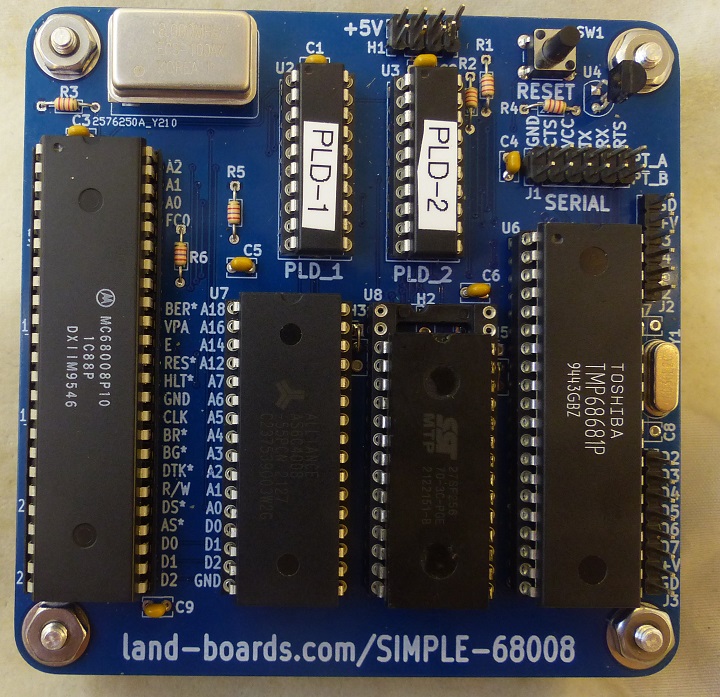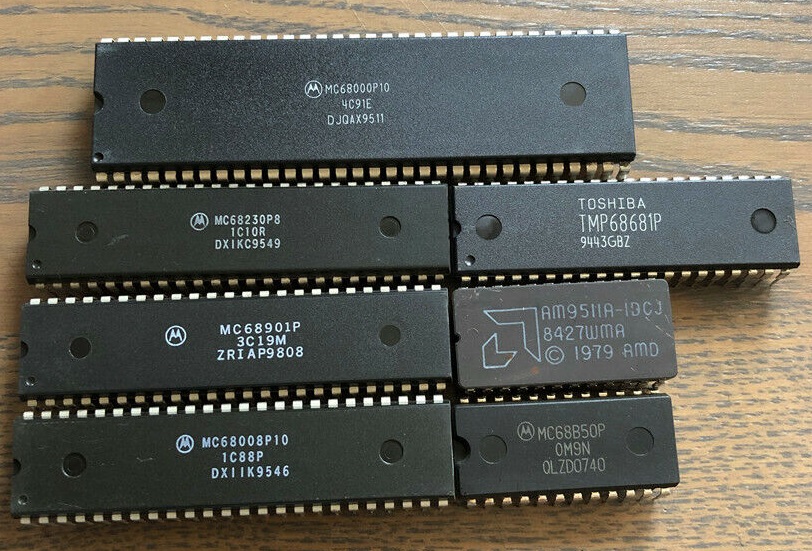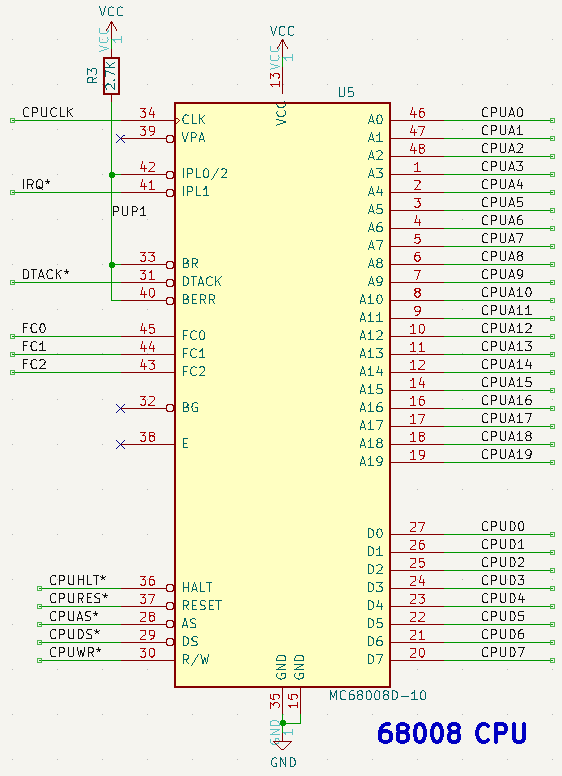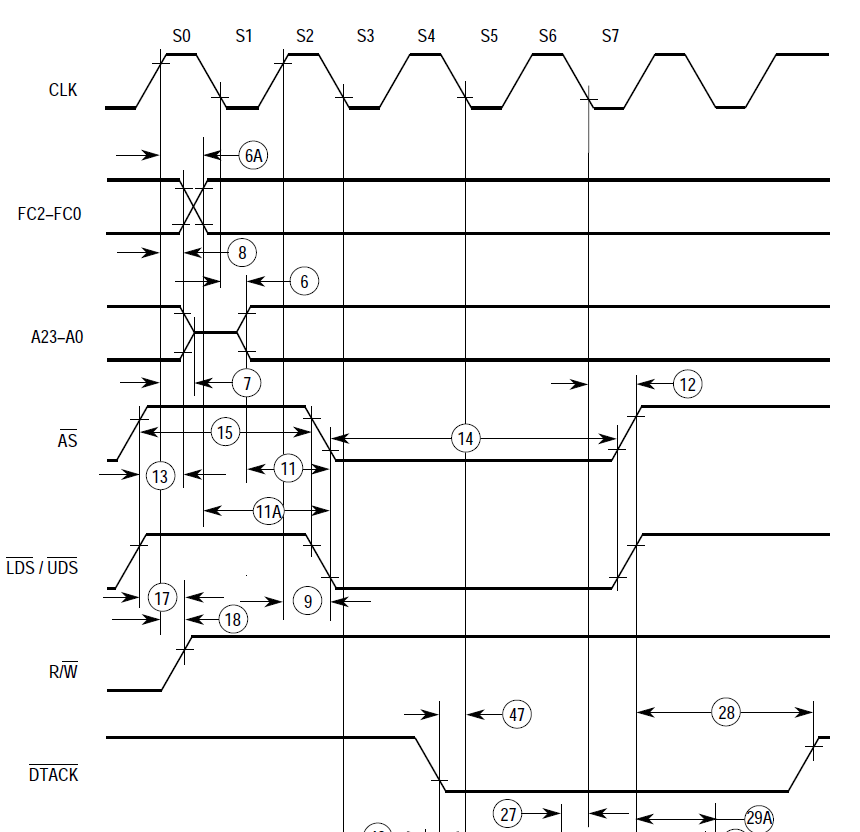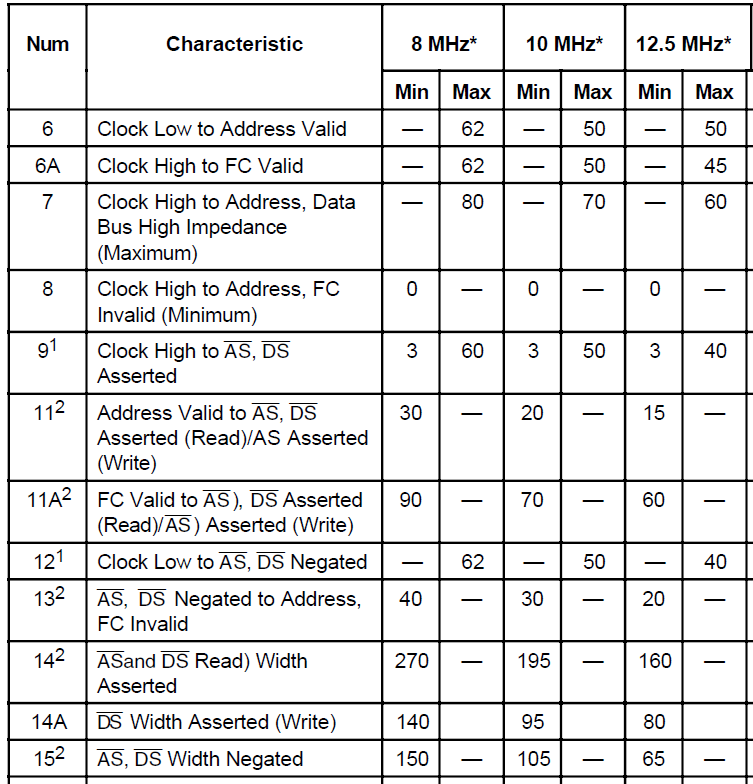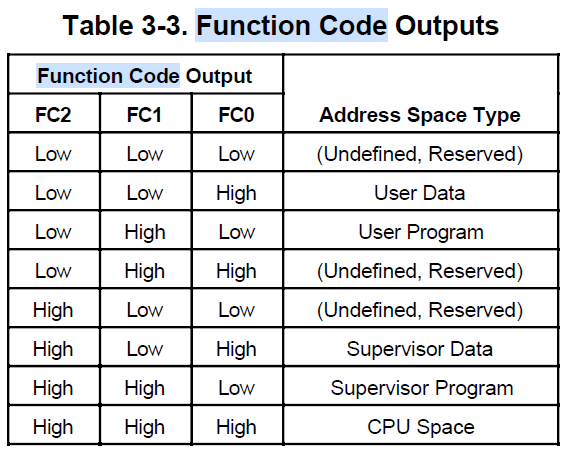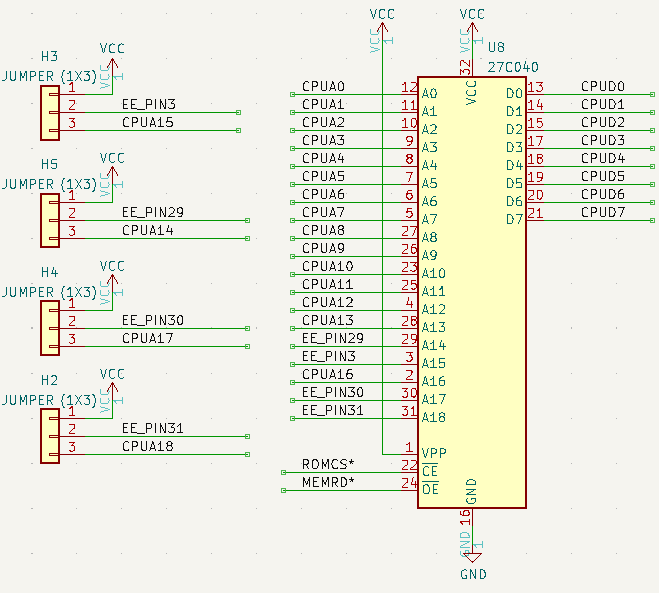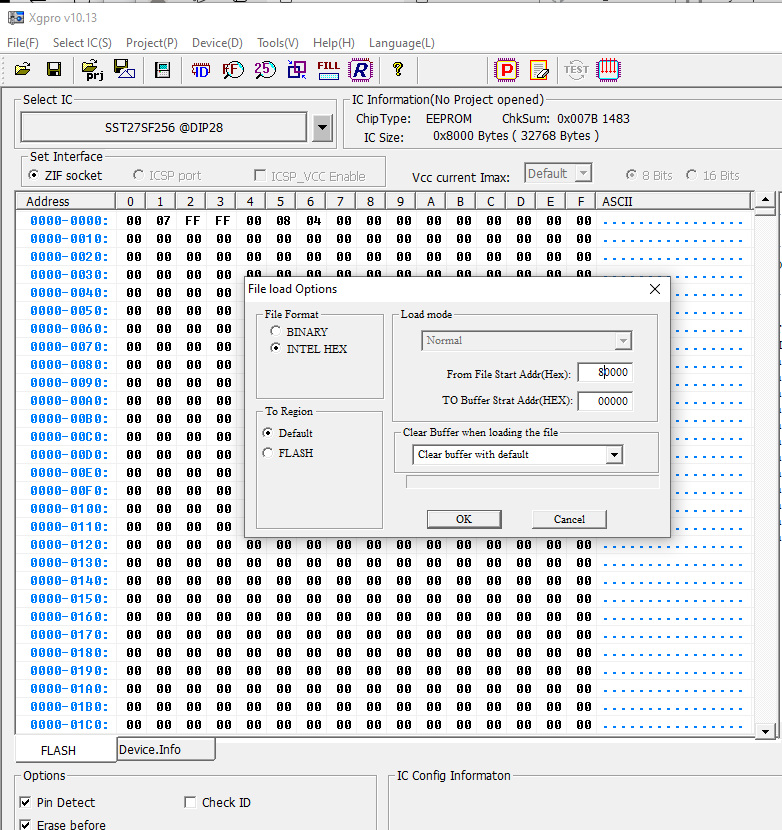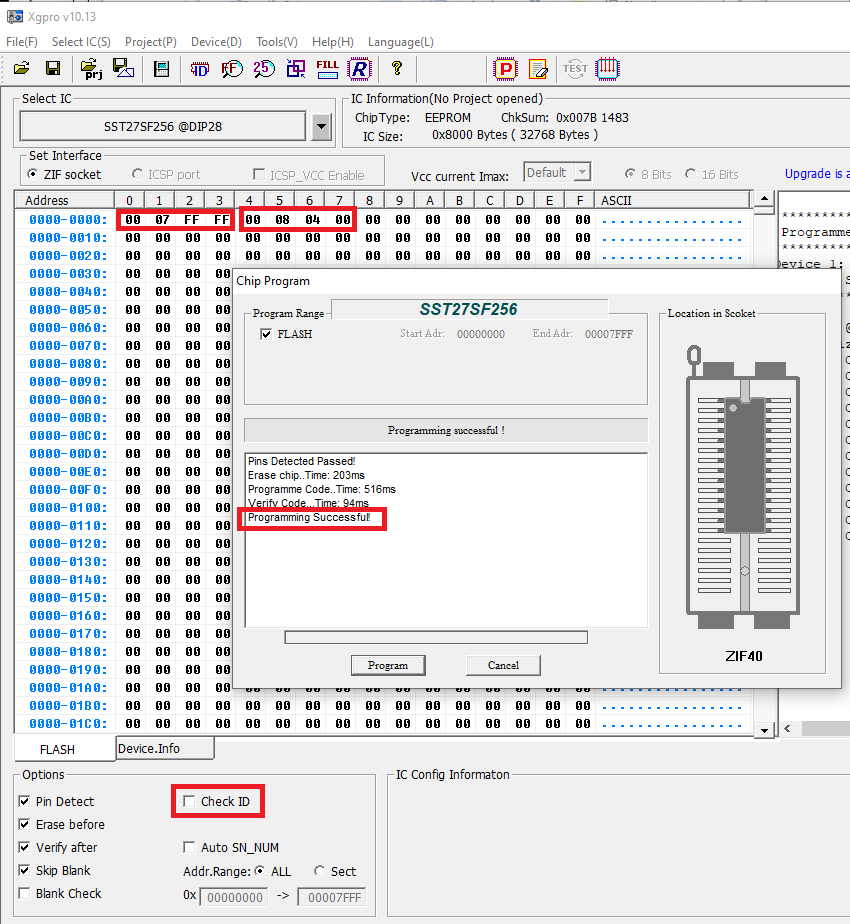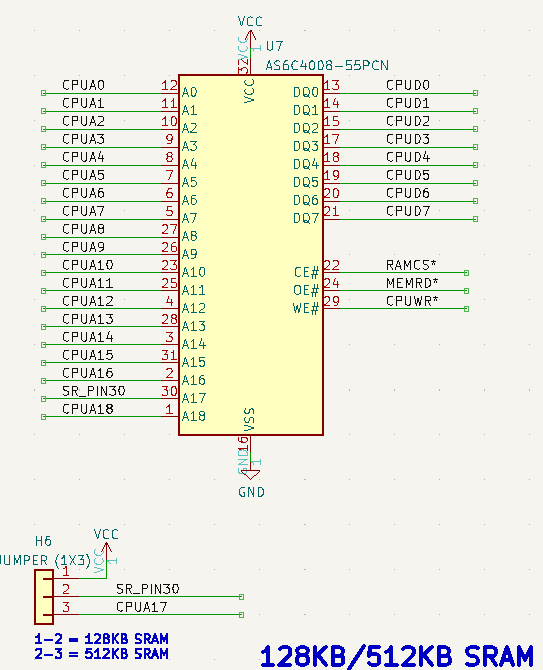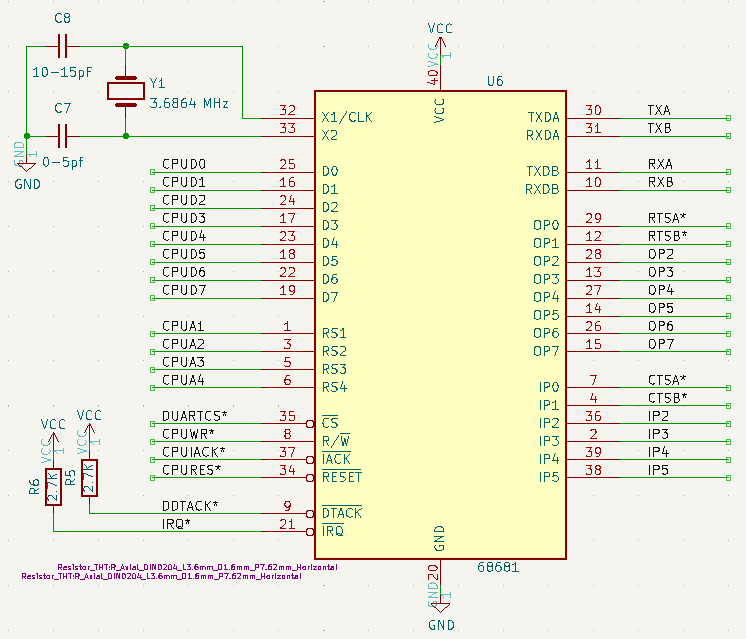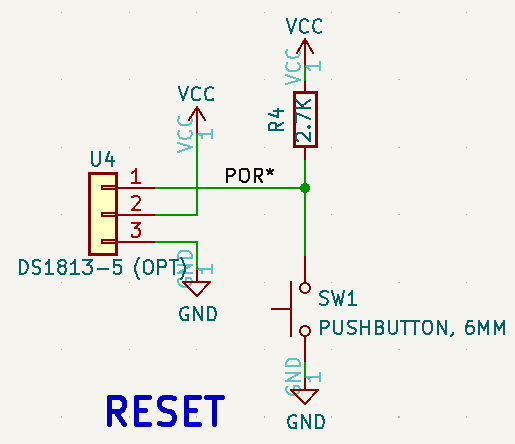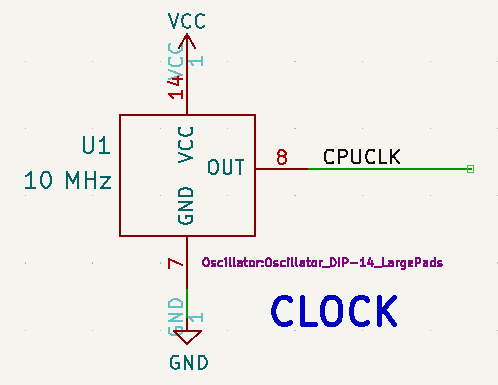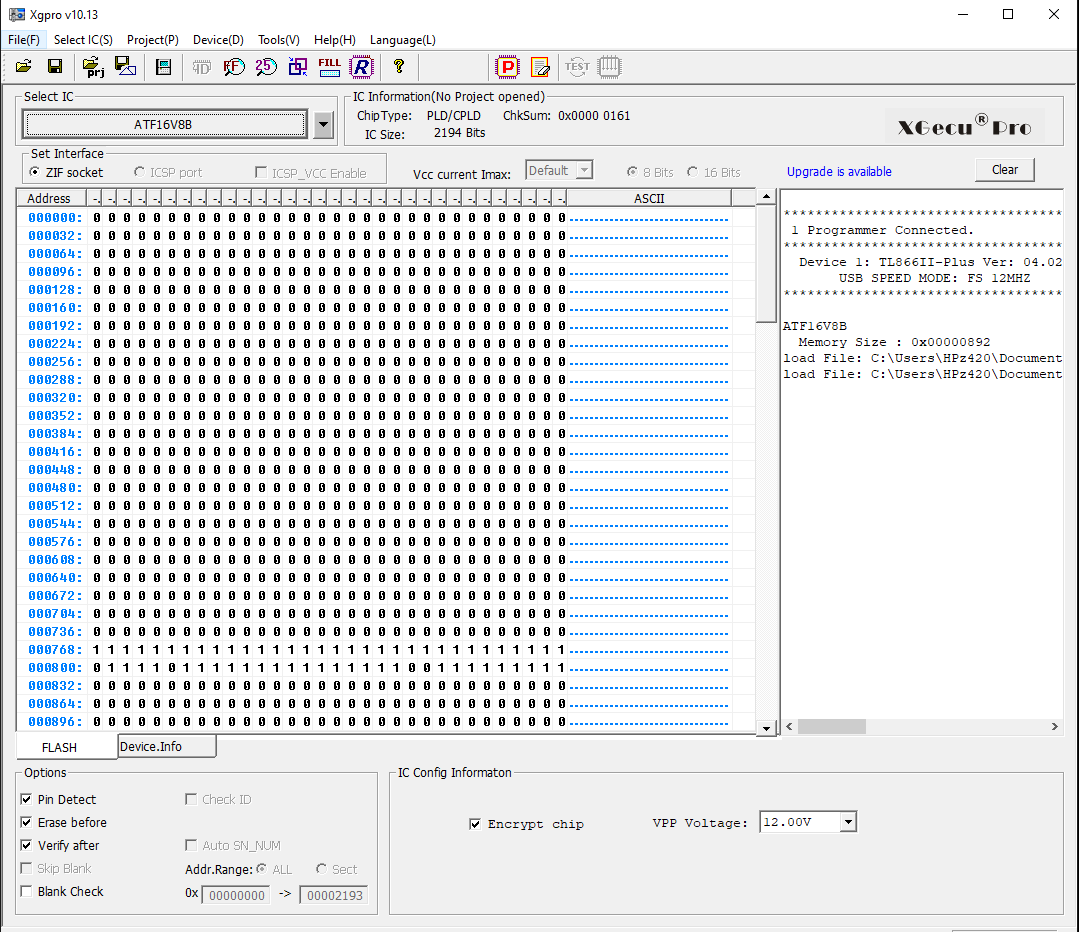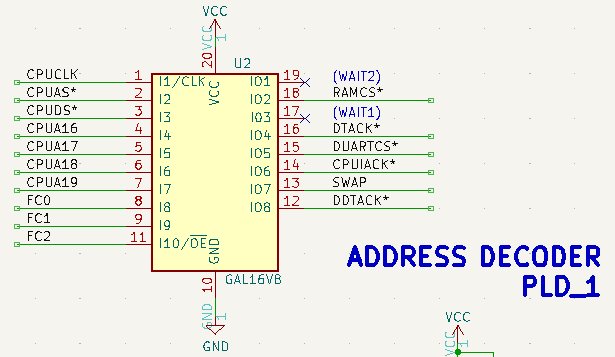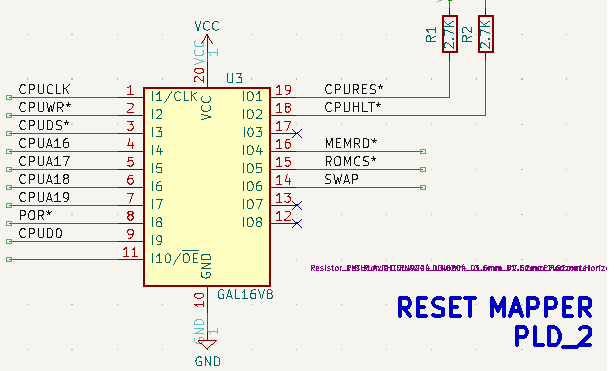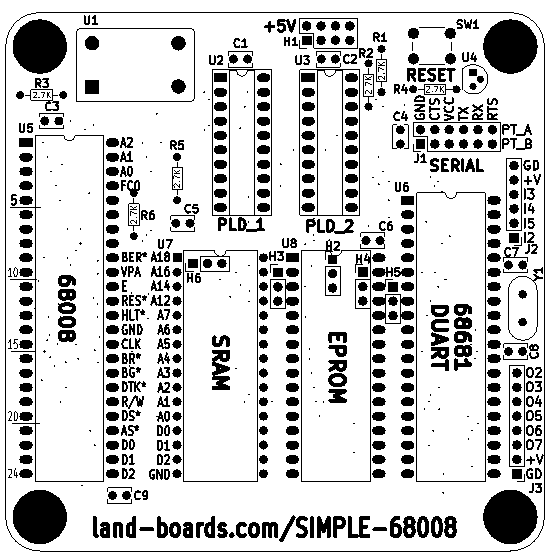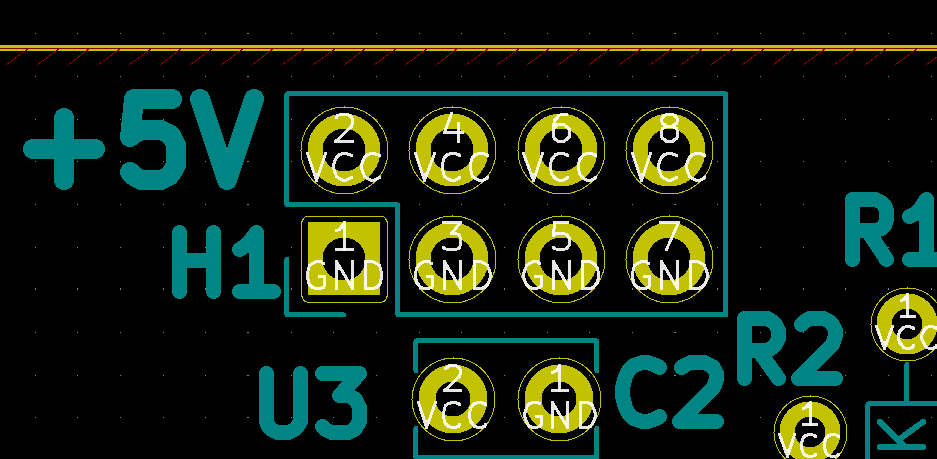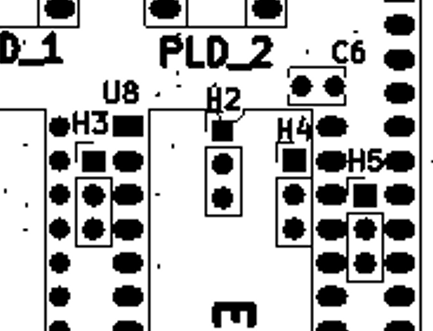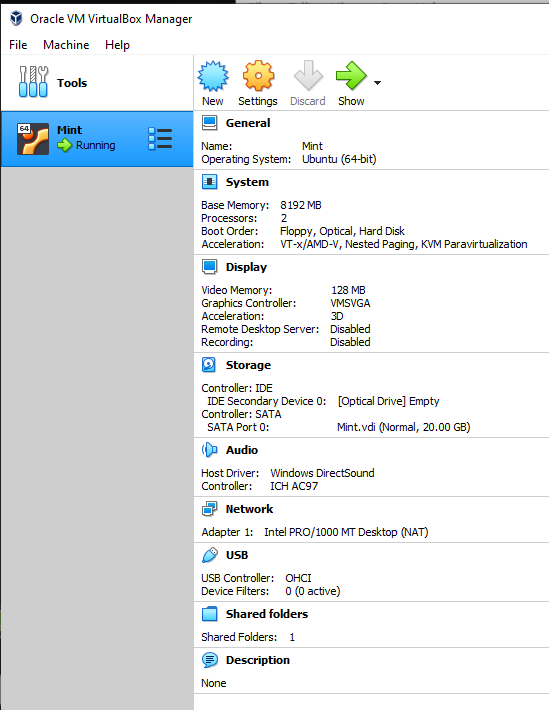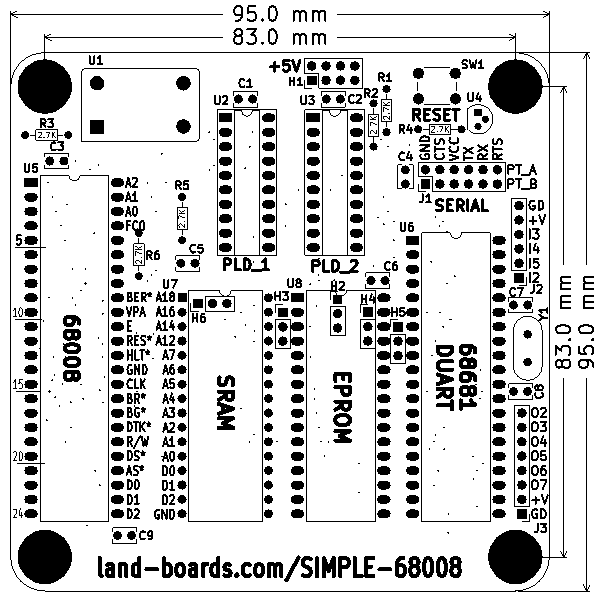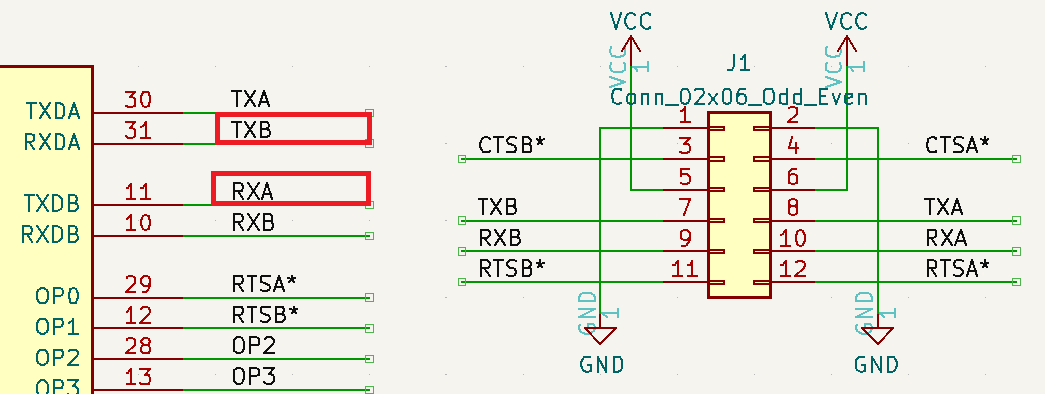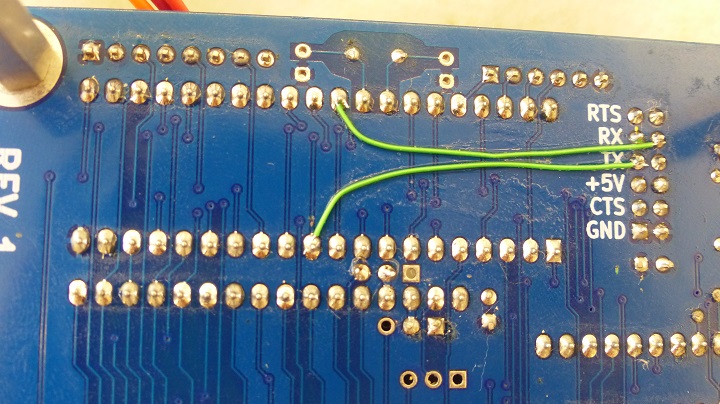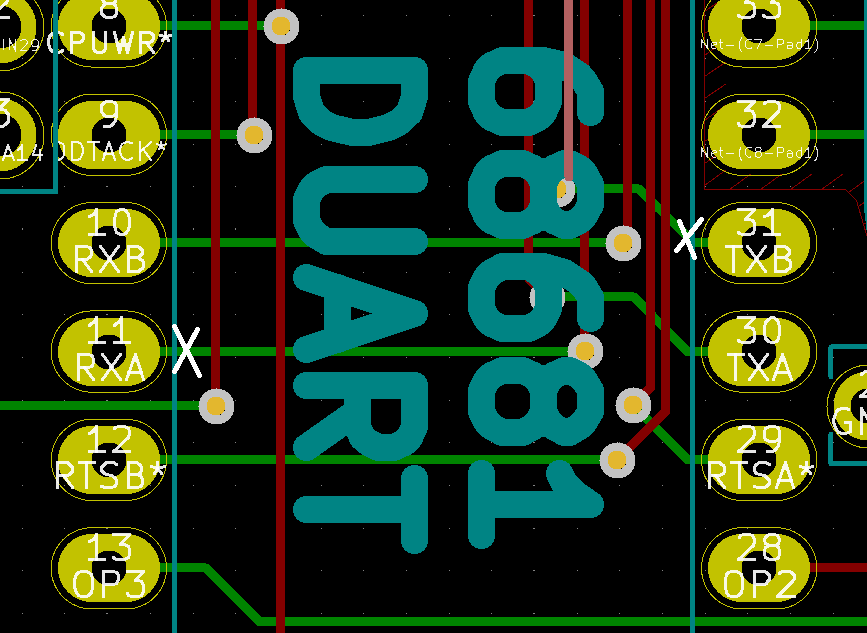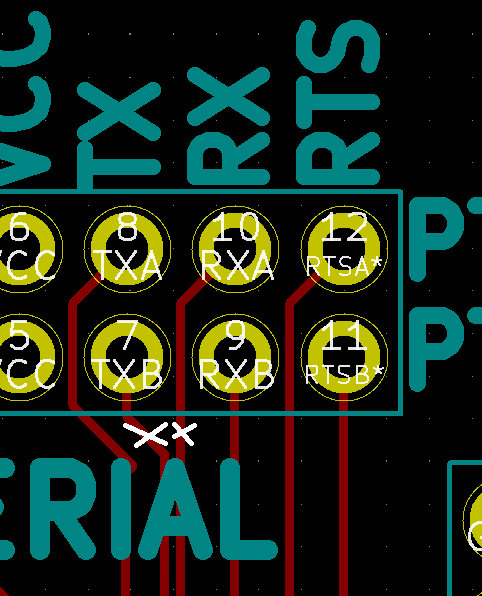SIMPLE-68008
Contents
Features
- 68008 CPU
- 20 bit address space (1MB total)
- 10 MHz clock
- 128KB/512KB SRAM
- Up to 448KB EPROM/EEPROM
- 68681 Dual Serial Port (ACIA)
- Headers for FTDI
- 38,400 baud
- Reset switch with optional Power Supervisor
- 5V operation
- 375 mA nominal
- 95x95mm card
- (4) 6-32 mounting holes
Memory Map
- The memory map depends on two things
- Mapping in the PLDs
- The firmware that is being run on the card
Maximal Capacity Design
- 0x00000-0x7FFFF 512KB SRAM
- 0x80000-0xEFFFF Up to 448KB EPROM (minus DUART I/O space)
- 0xF0000-0xFFFFF Serial (ACIA)
Chip Set
Parts in "Kit"
- MC68000P10 - 68K CPU with 16-bit data bus and 24-bit address bus
- MC68230P8 - Parallel I/O bits, timer
- TMP68681P - Dual UART, 8-bit I/O, 6-bit I/O
- MC68901P - Multifunction (8 I/O pins, interrupt controller, (4) timers, UART
- AM8511A - Floating Point Unit
- MC68008P10 - 68K CPU with 8-bit data bus and 20-bit address bus
- 65B50P - ACIA (Serial interface)
Design
CPU
The Motorola 68008 is an 8/32-bit microprocessor introduced by Motorola in 1982. It is a version of 1979's Motorola 68000 with an 8-bit external data bus, as well as a smaller address bus. The 68008 was available with 20 address lines (48-pin package) which allowed 1 MB address space versus the 16 MB addressable on the 68000.
CPU Timing
Function Code
EPROM
- SST27C256 EEPROM
- 32 KB part
- 28 pin part, 32 pin socket
Flash Memory (EEPROM) Programming
- Program using TL-866ii plus programmer
- Select device type
- Using SST 27SF256 part (Part is 32 KB)
- File Open
- Select file = S68K_001.hex
- File format: INTEL_HEX
- To Region: Default
- Set EPROM offset when file is loaded to accommodate memory map offsets for EPROM space
- Set From File Start Addr(Hex) to 80000
- To Buffer Start Addr(Hex) to 00000 (should be already that value)
- Got Device ID error
- Turn off ID checkbox in the Options section (bottom left of window)
- Device programmed/verified
- Memory Buffer should look like
Device ID Mysteries
- Ebay has parts with SST marking
- EPROM Programmer says the parts are WinBond (Manufacturer ID 0xDA)
- Part marked as 27SF512 and it's a 27C512 (Part ID 0x08)
- Windbond 27C512 qty 10 are cheaper than SST part on ebay
SRAM
- Using 512 KB SRAM
- Wire jumper H6-2 to H6-3 on rear of card
Dual UART
Reset
Clock
- Test and works with 8 MHZ and 10 MHz crystal oscillator
PLDs
- Two ATF16V8B PLDs (Datasheet)
- WinCupl compiler
- Program using TL-866ii plus programmer
PLD_001
PLD_001 Source Listing
Name SIMPLE-68008_PLD_1; Partno ATF16V8B; Date 06/19/24; Revision 01; Designer DOUG G; Company LAND BOARDS LLC; Assembly U02; Location RUSTBELT, USA; Device G16V8; /* */ /* Inputs */ PIN 1 = CLK; PIN 2 = !CPUAS; PIN 3 = !CPUDS; PIN 4 = CPUA16; PIN 5 = CPUA17; PIN 6 = CPUA18; PIN 7 = CPUA19; PIN 8 = CPUFC0; PIN 9 = CPUFC1; PIN 11 = CPUFC2; PIN 12 = !DDTACK; PIN 13 = SWAP; /* Outputs */ PIN 14 = !CPUIACK; PIN 15 = !DUARTCS; PIN 16 = !CPUDTACK; PIN 17 = WAIT1; PIN 18 = !RAMSEL; PIN 19 = WAIT2; CPUIACK = CPUFC2 & CPUFC1 & CPUFC0 & CPUDS; DUARTCS = CPUA19 & CPUA18 & CPUA17 & CPUA16 & CPUDS & !CPUFC1 & CPUFC0; RAMSEL = !CPUA19 & SWAP & CPUDS & !CPUFC1 & CPUFC0 /* User/Super Data */ # !CPUA19 & SWAP & CPUDS & CPUFC1 & !CPUFC0; /* User/Super Program */ CPUDTACK = CPUA19 & CPUA18 & CPUA17 & CPUA16 & CPUDS & DDTACK /* DUART */ # CPUA19 & !CPUA18 & CPUDS /* EPROM */ # CPUA19 & !CPUA17 & CPUDS /* EPROM */ # CPUA19 & !CPUA16 & CPUDS /* EPROM */ # !CPUA19 & CPUDS; /* RAM */
PLD_002
PLD_002 Source Listing
Name SIMPLE-68008_PLD_2; Partno ATF16V8B; Date 06/19/24; Revision 01; Designer DOUG G; Company LAND BOARDS LLC; Assembly U03; Location RUSTBELT, USA; Device G16V8; /* RESET CONTROLLER, ROM CHIP SELECT */ /* Inputs */ PIN 1 = CLK; PIN 2 = !CPUWR; PIN 3 = !CPUDS; PIN 4 = CPUA16; PIN 5 = CPUA17; PIN 6 = CPUA18; PIN 7 = CPUA19; PIN 8 = !POR; PIN 9 = CPUD0; /* Outputs */ PIN 13 = SWAPADR; PIN 14 = SWAP; PIN 15 = !ROMCS; PIN 16 = !MEMRD; PIN 18 = !CPUHLT; PIN 19 = !CPURES; /* CLEAR SWAP AT POWER UP, RESET */ /* SET SWAP BY 1ST WR TO START OF EPROM SPACE */ /* SWAP.CK = CLK; */ /* SWAP.AR = POR; */ MEMRD = !CPUWR & CPUDS & !CPUA19 # !CPUWR & CPUDS & CPUA19 & !CPUA18 # !CPUWR & CPUDS & CPUA19 & !CPUA17 # !CPUWR & CPUDS & CPUA19 & !CPUA16; SWAP = CPUDS & CPUWR & CPUA19 & !CPUA18 & !CPUA17 & !CPUA16 & CPUD0 & !POR # SWAP & !POR; SWAPADR = CPUDS & CPUWR & CPUA19 & !CPUA18 & !CPUA17 & !CPUA16; ROMCS = CPUDS & !CPUWR & CPUA19 & !CPUA18 # CPUDS & !CPUWR & CPUA19 & !CPUA17 # CPUDS & !CPUWR & CPUA19 & !CPUA16 # CPUDS & !CPUA19 & !CPUA18 & !CPUA17 & !CPUA16 & !SWAP; CPUHLT.OE = POR; CPUHLT = POR; CPURES.OE = POR; CPURES = POR;
Headers / Connectors
J1 - 2 port FTDI / TTL Serial
- 2x6 header
- Direct connect to DTE RS-232 card
- Flip order to connect to USB to TTL Serial (FTDI)
- TX<>RX
- RTS<>CTS
- Pinout
- GND
- CTS* (in)
- +5V
- Transmit (out)
- Receive (in)
- RTS* (out)
J2 - Input Port
- Input 2
- Input 5
- Input 4
- Input 3
- Vcc
- GND
J3 - Output Port
- GND
- Vcc
- Output 7
- Output 6
- Output 5
- Output 4
- Output 3
- Output 2
H1 - 5V Power
- 2x4 header
H2-H5 - EPROM/EEPROM Select Jumpers
- H2 = EE PIN 31
- H3 = EE PIN 3
- H4 = EE PIN 30
- H5 = EE PIN 29
27SF256
- 27SF256 is a 28 pin part, socket is 32 pins
- H2 = Not installed
- H3-2 to H3-3 = A15 (Vpp on 27SF256, but pin can be either high or low)
- H4-1 to H4-2 = Vcc
- H5-2 to H5-3 = CPUA14
EEPROM Jumpers
| 27040 | 27020 | 27010 | 27512 | 27256 | 27128 | 2764 | PIN(32) | PIN(28) | PIN(28) | PIN(32) | 2764 | 27128 | 27256 | 27512 | 27010 | 27020 | 27040 | |
|---|---|---|---|---|---|---|---|---|---|---|---|---|---|---|---|---|---|---|
| VPP | VPP | VPP | N/A | N/A | N/A | N/A | 1 | N/A | N/A | 32 | N/A | N/A | N/A | N/A | VCC | VCC | VCC | |
| A16 | A16 | A16 | N/A | N/A | N/A | N/A | 2 | N/A | N/A | 31 (H2) | N/A | N/A | N/A | N/A | PGM | PGM | A18 | |
| A15 | A15 | A15 | A15 | VPP | VPP | VPP | 3 (H3) | 1 | 28 | 30 (H4) | VCC | VCC | VCC | VCC | N/C | A17 | A17 | |
| A12 | A12 | A12 | A12 | A12 | A12 | A12 | 4 | 2 | 27 | 29 (H5) | PGM | PGM | A14 | A14 | A14 | A14 | A14 | |
| A7 | A7 | A7 | A7 | A7 | A7 | A7 | 5 | 3 | 26 | 28 | A13 | A13 | A13 | A13 | A13 | A13 | A13 | |
| A6 | A6 | A6 | A6 | A6 | A6 | A6 | 6 | 4 | 25 | 27 | A8 | A8 | A8 | A8 | A8 | A8 | A8 | |
| A5 | A5 | A5 | A5 | A5 | A5 | A5 | 7 | 5 | 24 | 26 | A9 | A9 | A9 | A9 | A9 | A9 | A9 | |
| A4 | A4 | A4 | A4 | A4 | A4 | A4 | 8 | 6 | 23 | 25 | A11 | A11 | A11 | A11 | A11 | A11 | A11 | |
| A3 | A3 | A3 | A3 | A3 | A3 | A3 | 9 | 7 | 22 | 24 | OE* | OE* | OE* | OE* | OE* | OE* | OE* | |
| A2 | A2 | A2 | A2 | A2 | A2 | A2 | 10 | 8 | 21 | 23 | A10 | A10 | A10 | A10 | A10 | A10 | A10 | |
| A1 | A1 | A1 | A1 | A1 | A1 | A1 | 11 | 9 | 20 | 22 | CE* | CE* | CE* | CE* | CE* | CE* | CE* | |
| A0 | A0 | A0 | A0 | A0 | A0 | A0 | 12 | 10 | 19 | 21 | D7 | D7 | D7 | D7 | D7 | D7 | D7 | |
| D0 | D0 | D0 | D0 | D0 | D0 | D0 | 13 | 11 | 18 | 20 | D6 | D6 | D6 | D6 | D6 | D6 | D6 | |
| D1 | D1 | D1 | D1 | D1 | D1 | D1 | 14 | 12 | 17 | 19 | D5 | D5 | D5 | D5 | D5 | D5 | D5 | |
| D2 | D2 | D2 | D2 | D2 | D2 | D2 | 15 | 13 | 16 | 18 | D4 | D4 | D4 | D4 | D4 | D4 | D4 | |
| GND | GND | GND | GND | GND | GND | GND | 16 | 14 | 15 | 17 | D3 | D3 | D3 | D3 | D3 | D3 | D3 |
H6 - SRAM Configuration
- 1-2 = 128KB SRAM
- 2-3 = 512KB SRAM
- 128KB and 512KB Parts are about the same price so there's not much point (if buying parts anyway) with going with 512KB part
- AS6C4008-55PCN is $6.38 (2024-06)
- AS6C1008-55PCN is $2.91 (2024-06)
SIMPLE-68008 Software
- 68000 code development is done with cross assemblers/compilers using GCC tools under Linux
Linux Development Environment
- Using Oracle VM VirtualBox
- Running Linux Mint
- The GNU C-Compiler with Binutils and other useful tools for 68000 cross development
- This is a Makefile based approach to build the toolchain to reduce the build time.
- The original work was by Steve Moody Moody's page
- These tools are build:
- binutils
- gcc with libs for C/C++/ObjC
- vasm
- vbcc
- vlink
- newlib
Code
- Test Code
- Set up stack, starting address
- Initialize DUART
- Input/Output Serial routines
- Loop forever
Makefile
all: S68K_001.hex S68K_001.bin S68K_001.o: S68K_001.s /opt/m68k-elf/bin/m68k-elf-as -m68000 -alms -a=S68K_001.lst -o S68K_001.o S68K_001.s S68K_001.bin: S68K_001.o /opt/m68k-elf/bin/m68k-elf-objcopy -O binary S68K_001.o S68K_001.bin S68K_001.hex: S68K_001.o /opt/m68k-elf/bin/m68k-elf-objcopy -O srec S68K_001.o S68K_001.tmp srec_cat S68K_001.tmp --crop 0x80000 0x80fff -o S68K_001.sre srec_cat S68K_001.tmp --crop 0x80000 0x80fff -o S68K_001.hex -Intel # rm S68K_001.tmp clean: $(RM) S68K_001.lst S68K_001.o S68K_001.bin S68K_001.sre S68K_001.hex S68K_001.tmp
TUTOR Monitor
- TUTOR 1.2 Monitor
- Addressing issues due to code being designed for ROM at below 64K
68k-Monitor
- ChartreusK 68K monitor = 68901 DUART code
Mechanicals
Checkout
Rev 2 Card
- Fixed DUART TXB and RXA connections
- Add some silkscreen annotations for header connections *
Rev 1 Card
- Reset working
- Reset switch and monitor working
- Clock working
- EPROM working
- SRAM working
- Checked Serial port
- Not using any XTAL capacitors
- Serial transmit/receive lines swapped
- TXB and RXA are swapped on DUART
- U6 pins 11 and 31 need to be swapped
- Easiest cuts (on bottom of board)
- 2 Jumpers
- Silkscreen/traces (from front side)
- Alternative cut (harder due to space and being on top of board)
